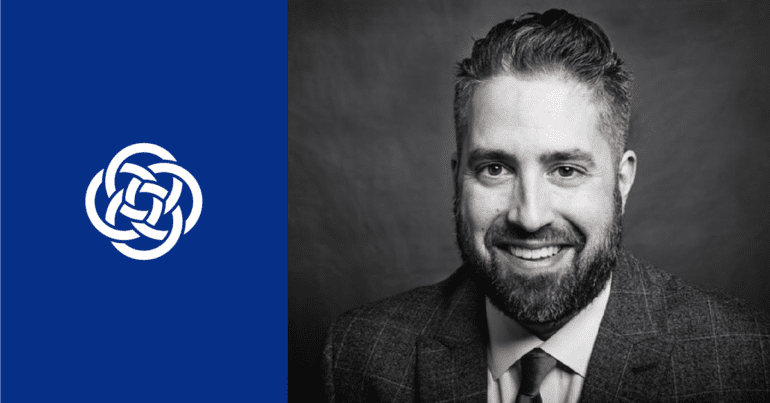Why do you get up in the morning? What drives you to learn, to push, to help others? Is there a driving force behind everything we do? Could the reason be that we know we only have a finite number of days?
Alumnus Jason LaHood, Psy.D., believes mortality is the reason we get out of bed.
“If we weren’t linked to death, we wouldn’t get up and do anything. It’s the thing that motivates us to get up every day,” LaHood says. “That’s why I love being a psychologist, because you’re working at the forefront of a client’s mortality—and that’s the essence of life.”
The link between life and death has laid the framework for his profession as a clinical psychologist in his own private practice. After completing his education at The Chicago School and becoming licensed in 2010, he opened Sankofa Psychological Services in January of 2011.
In addition to client services, they also operate the college counseling centers for John Marshal Law School and Illinois College of Optometry, serve Chicago Public Schools with therapy and psycho-educational evaluations, while providing training for many doctoral students.
“I always knew I wanted to work in private practice. Each clinician has to choose for themselves what type of work fits with their personality, and the things that they value and the type of care that they want to give. I’m a clinical psychologist first, but I’m also a businessman and it was really the best way in this field that I could start my own business, as well,” Dr. LaHood says.
Private practice focus
As a private practice, Sankofa Psychological Services focuses on trauma across the lifespan.
A career in psychology provides a lot of valuable paths to choose from, but because of his personal experiences and studies at The Chicago School, Dr. LaHood has come to believe that trauma is the connecting factor behind most mental illnesses. This trauma-focus leads the way for his private practice, and in the confines of this type of practice, allows him to see a diverse range of clients and help many different types of issues.
“I think for me trauma is a part of every mental illness,” Dr. LaHood says. “In depression and anxiety and all of these different areas, all of them are rooted in some sort of trauma, whether it be being a victim of human trafficking, or just having a relationship with somebody that was emotionally abusive. In private practice, we deal with high-functioning clients. High-functioning doesn’t mean there isn’t any trauma; high-functioning means in spite of all the suffering, people are able to go to work and live their lives.”
New treatments offer solutions
In addition to shining light on everyday trauma, Dr. LaHood is also interested in new treatments that go beyond cognitive behavior treatment, especially ketamine IV treatments. Having experienced firsthand the effectiveness of this treatment, he’s leading the charge to inspire clinicians to explore these options for deep depression and complex trauma.
“Ketamine IV infusions are a new kind of innovative treatment that’s really emerged in the past few years for major depression, PTSD, and OCD. It’s been an incredible journey to watch people who have suffered for decades with untreatable depression and complex trauma, and now they’re emerging from that living their lives. It doesn’t mean that they’re not suffering anymore, but they’re able to live,” Dr. LaHood says.
Dr. LaHood tells the story of a client who had lived with a stutter for 50 years, and after one ketamine IV treatment, lost his stutter. The benefits are clear and astounding in the mental health field. Personally, Dr. LaHood experienced the way ketamine helped him out of his own depression and suicidal thoughts.
“Ketamine is a depression crusher, and once you’re not depressed, you’re sentenced to life. You have to live,” Dr. LaHood says. “I know this because my mom suicided in 2002 and I spent a lifetime trying to keep her alive. So I understand that she had the courage to die and I had the courage to live and again, those are two very different things, but the courage is the same.”
Community through podcasting
His experience with ketamine led to the creation of his podcast, “Sentenced to Life,” when he met his cohost at a ketamine conference and a connection was made. In the podcast, they talk with experts across the psychology field and take on difficult issues that people face every day, hoping to bring a sense of community to those who listen.
Dr. LaHood credits The Chicago School for its focus on diversity in building a sense of community with clients. “When you’re talking about diversity, we learned to break down these narratives about different populations that are in our society when working with clients,” he says. “We have to see how they were ostracized and marginalized in some way. Even if it didn’t have to do with race, we’re essentially talking about ‘the other,’ and how do we talk to that person that feels ‘other-ed?’ There are lots of ways that people in our society become the other and that can really provoke psychological suffering.”
Approaching every client with empathy and finding a way to identify with them, Dr. LaHood has been able to become more than just a practitioner, but also a business owner pushing the envelope on treatment options that best serve people in need.
Learn more about The Chicago School
If you would like to learn more about our undergraduate, graduate, and certificate programs in psychology, fill out the form below to request more information. Or you can apply today through our application portal.

